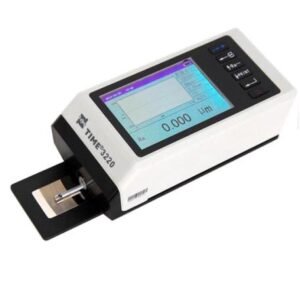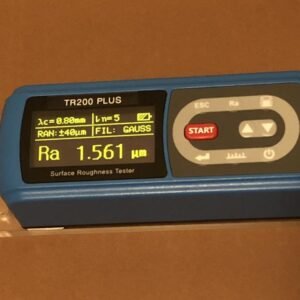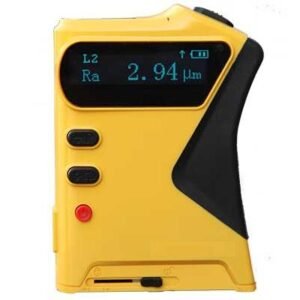Time 3220 Surface Roughness Tester-1
Description
Time 3220 Surface Roughness Tester

Accuracy (≤±10%)
Repeatability (≤6%) Measurement Range (400μm)
Introduction The new TIME 3220 surface roughness tester is suitable for the scientific labs, factory metrology rooms and working site. It can test the surface roughness of various machining components and allows for user selectable 45 roughness units in Ra, Rz etc. The testing results and surface profile can be stored in 3220 unit and be output to PC.
Features 45 Multi-parameter measuring: Ra、Rp、Rv、Rt、Rz、Rq、Rsk、Rku、Rc、RPc、RSm、Rmr(c)、tp、Rmr、Rpm、Rz1max、RzJIS、Rmax、Htp、Rδc、RΔq、RΔa、 Pa、Pp、Pv、Pt、Pz、Pq、Psk、Pku、Pc、PSm、Pmr(c)、Pmr、Pz1max、PzJIS、Pδc、PΔq、Rk、Rpk、Rvk、Mr1、Mr2、A1、A2
Touch screen / TIFT coloured LED display
High accuracy inductance pickup
Filtering methods of 2RC, GAUSS
Conforms to standards of ISO1997, ANSI and JIS2001
Display showing all parameters values and graphs after measurement
Can be connected to PC or mini printer to print all parameters and graphs
Both USB port and RS232 interface
Automatic switch off
Applications:
Automobile industry
Manufacturing of mechanical parts and gearing
Facilities for metal processing and accessories and functional parts of lathe
Universal machine and metal moulding equipment
Surface polishing and treatment
Metallurgy, rolling and forging equipment
Pneumatic and hydraulic elements and pressure vessel
Foundry of mould
Press, packing, light industry and spinning machine, and medical appliance
Petroleum, chemical engineering, coal and cement machine, and agriculture mechanism
Pharmaceutical machine
Equipments of electric power, auto-control, electronic communication
Aviation and Aero business
Research Universities, institutes
Paper-making industry
Industry of ceramics, piezoelectric ceramics, electric ceramics, porcelain, high-aluminum ceramic stick
epoxy, polyethylene
Canal of liquid, compound glass fiber silence-tube
Construction business such as Alloy doors and windows, handle of door, parts of chair, surface of
stainless steel cup and dishware, exterior of taps
Crystal, carbon silicon, graphite, film of diamond, magnet
Chrome-plating battery,canister of telescope
Copper-foil stationary, hard alloy ball, base for ball, auto-pencil lead
Medical equipment and clothing-making machine
Technical Specification
Test Principle Inductance type
Measurement Range 400μm
Stylus tip Radius 5μm/2μm
Stylus tip Material Diamond
Measuring force 4mN/0.75 mN
Stylus tip Angle 90°/60°
Radius of Skid curvature 45mm
Maximum drive range 19mm/0.748inch
Traversing speed
Measuring: Cut off length = 0.08 mm Vt=0.25 mm/s
Cut off length = 0.25 mm Vt=0.25mm/s
Cut off length = 0.8 mm Vt=0.5 mm/s
Cut off length=2.5mm Vt=1mm/s
Returning V=1mm/s
Accuracy Less than or equal to ±10%
Repeatability ≤6%
Cut-Off Length 0.08mm,0.25mm,0.8mm,2.5mm selectable
Evaluation Length (1~5 )L selectable
Measuring rang and
resolution
Measuring Range Resolution
Automatic
0.001μm
0.008μm
±50μm 0.001μm
±200μm 0.008μm
Power Built-in Li battery
Power adapter Input: 100 V~240VAC,50/60Hz Output: 9V, 3A
Working environment
Temperature: 0℃~40℃ Humidity: < 90%
RH
Storage and transport
environment
Temperature: – 40℃ ~ 60℃ Humidity: <
90% RH
Dimensions 155.4×75×56mm
Weight Approximately 760g
Standard delivery:
TIME 3220 main unit
Standard pickup stylus transducer
Calibration certificate
Roughness standard
Software and connection cable
Levelling support
Protective nose
Typical applications:
The mechanical manufacturing industry, mostly the manufacture of metal. The primary function of
roughness tester is testing the surface roughness of processing parts especially the pot-ball roughness
tester is adept to testing the hard surface. For example the automobile parts manufacturing, mechanical
parts manufacturing, etc. the roughness tester is essential in every manufacturing industry engaged in
quality of parts surface.
The manufacturing of Non-metal. As the development of science and technology, more and more new
materials are used in manufacturing techniques, for example, pottery, plastic, polyethylene, etc. now
some bearings are made in special pottery, and some pump valves are made in polyethylene. These
materials all have firm character, and some of them can be made into parts instead of metal. Their
surface roughness also needs testing in manufacture.
Besides the mechanical processing, surface roughness testing is also used in electric power,
communication and electron, so much as stationery, dishware etc.
You must be logged in to post a review.





Reviews
There are no reviews yet.